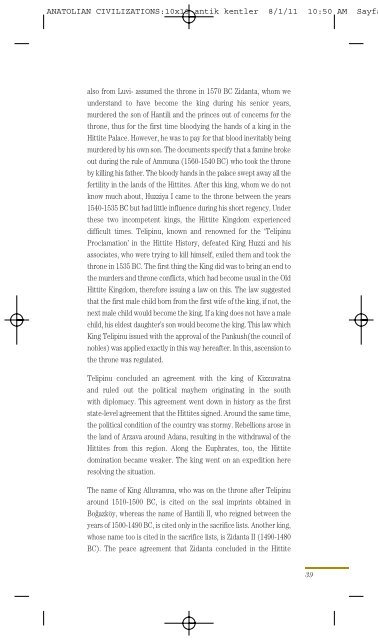Anatolian Civilizations and Historical Sites - TEDA
Anatolian Civilizations and Historical Sites - TEDA
Anatolian Civilizations and Historical Sites - TEDA
Create successful ePaper yourself
Turn your PDF publications into a flip-book with our unique Google optimized e-Paper software.
ANATOLIAN CIVILIZATIONS:10x19 antik kentler 8/1/11 10:50 AM Sayfa<br />
also from Luvi- assumed the throne in 1570 BC Zidanta, whom we<br />
underst<strong>and</strong> to have become the king during his senior years,<br />
murdered the son of Hantili <strong>and</strong> the princes out of concerns for the<br />
throne, thus for the first time bloodying the h<strong>and</strong>s of a king in the<br />
Hittite Palace. However, he was to pay for that blood inevitably being<br />
murdered by his own son. The documents specify that a famine broke<br />
out during the rule of Ammuna (1560-1540 BC) who took the throne<br />
by killing his father. The bloody h<strong>and</strong>s in the palace swept away all the<br />
fertility in the l<strong>and</strong>s of the Hittites. After this king, whom we do not<br />
know much about, Huzziya I came to the throne between the years<br />
1540-1535 BC but had little influence during his short regency. Under<br />
these two incompetent kings, the Hittite Kingdom experienced<br />
difficult times. Telipinu, known <strong>and</strong> renowned for the ‘Telipinu<br />
Proclamation’ in the Hittite History, defeated King Huzzi <strong>and</strong> his<br />
associates, who were trying to kill himself, exiled them <strong>and</strong> took the<br />
throne in 1535 BC. The first thing the King did was to bring an end to<br />
the murders <strong>and</strong> throne conflicts, which had become usual in the Old<br />
Hittite Kingdom, therefore issuing a law on this. The law suggested<br />
that the first male child born from the first wife of the king, if not, the<br />
next male child would become the king. If a king does not have a male<br />
child, his eldest daughter’s son would become the king. This law which<br />
King Telipinu issued with the approval of the Pankush(the council of<br />
nobles) was applied exactly in this way hereafter. In this, ascension to<br />
the throne was regulated.<br />
Telipinu concluded an agreement with the king of Kizzuvatna<br />
<strong>and</strong> ruled out the political mayhem originating in the south<br />
with diplomacy. This agreement went down in history as the first<br />
state-level agreement that the Hittites signed. Around the same time,<br />
the political condition of the country was stormy. Rebellions arose in<br />
the l<strong>and</strong> of Arzava around Adana, resulting in the withdrawal of the<br />
Hittites from this region. Along the Euphrates, too, the Hittite<br />
domination became weaker. The king went on an expedition here<br />
resolving the situation.<br />
The name of King Alluvamna, who was on the throne after Telipinu<br />
around 1510-1500 BC, is cited on the seal imprints obtained in<br />
Bo¤azköy, whereas the name of Hantili II, who reigned between the<br />
years of 1500-1490 BC, is cited only in the sacrifice lists. Another king,<br />
whose name too is cited in the sacrifice lists, is Zidanta II (1490-1480<br />
BC). The peace agreement that Zidanta concluded in the Hittite<br />
39






